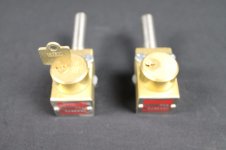So to recap, you have a 6/3 with ground wire running to the subpanel?
If its not feasible to run a new wire from the main panel to where the generator is located, I would look into a Kirk Key type trapped key interlock system such as:
Lot of 2 Kirk CK43670 Key Interlock with Key | eBay
View attachment 456392
Then one goes on the main breaker and the other goes on the generator breaker in the subpanel. The way it works is that in order to get the key out, it needs to be locked (with the rod on the lock extended).
In your system, you install one on the main breaker (so that the rod can only extend if the main breaker is off), and the other on the generator breaker (so that the rod can only extend if the generator breaker is off).
Then to switch, you shut off the main breaker, lock the main breaker interlock, remove the key, walk over to the generator breaker, unlock it and turn on the generator breaker.
The 2nd set of keys is to be stored in a safe place marked for what they are for and marked that only one set is to be used at a time.
Aaron Z

